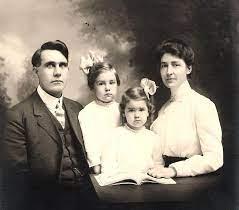Our Mission & History
Our Mission:
Evangelization and
Social Impact
The Evangelical Friends Church of Burundi was introduced in Burundi in 1933. Its belief is based on the creed of the apostles as evidenced by the doctrinal basis. Our Mission is to evangelize, to lead people to live together peacefully, to train, equip and mobilize them for integral development through interaction with the Bible, prayer and communion with God.

Our History and Evolution
Sent by Friends Africa Gospel Mission (FAGM - an American Quaker mission, originating from the Religious Society of Friends founded by George Fox), the missionaries led by Arthur Chilson (in the above picture together with his Children and wife Edna Chilson) found in Kibimba a population living with considerable socio-economic and educational needs. They had a difficult mission to bring this needy community to Christ and the task was not easy. Despite hostilities and various obstacles, Kibimba became a center and a cradle of Quakerism.
After Kibimba the Quaker missionaries set up an evangelical station in Mutaho (1936), then in Gitega-Kwibuka (1944) and finally in Kwisumo (1948). After the latter, their expansion ambitions calmed down and they began to stabilize and consolidate their achievements. They took care to draw up the constitution of the Church, with the idea of one day leaving the management of the Church of Friends in the hands of local Burundian Friends.
Between 1950 and 1972, the Quaker missionaries had achieved many good things, so that other Protestant congregations admired the Evangelical Friends Mission (MEAB) as a fairly solid entity with a lot of potential. Indeed, it operated the EMP of Kibimba, the Institute of Theology and the printing press of Mweya in collaboration with its allies. It also managed the CORDAC radio, the Kibimba hospital and the Nyankanda leprosarium.
In addition, being fundamentally evangelical, the MEAB was very active in the organization of evangelistic crusades and many people were won to Christ. It was from 1951 that, under the initiative of the MEAB and in collaboration with the World Church and the Free Methodist Church, the Bible School of Mweya opened its doors to future evangelists from the churches of the alliance. There were thirty students in all, thirteen of whom were Burundians from the four Quaker stations.
Very few of them survived the bloody events that shook the country. The brave Quaker evangelists not only brought the Bible, but they also set out to do development work. They brought printing machines for the production of evangelistic documents. This is how the Nyamyotsi dam was built and inaugurated in April 1938. The missionaries also initiated here and there in the various evangelical stations workshops which aimed to train Burundians to produce quality objects and materials and to educate them techniques for the construction of houses and buildings in sustainable materials. The first and best-equipped workshop for this purpose was set up in Kibimba.
The "MEAB" mounted a radio evangelism project as early as 1962 and the other churches of the Protestant alliance joined it. It was in 1963 that CORDAC radio was able to launch its first activities. The radio station was far-reaching because it was heard throughout Burundi, part of Congo and Rwanda. It strongly contributed to the spiritual openness of the people who were able to capture it. The activities of CORDAC radio ended in 1977 during the regime of Jean Baptiste Bagaza.
After this closure, the political situation of the moment did not allow the sustainability of the heritage of the said radio. Burundi became independent on July 1, 1962, while the missionaries were ready to hand over the management of the church to the Burundians Friends. The substantial aid from FAGM was to continue until 1984.
When they left in 1986, the missionaries left equipment, goods and infrastructures in the various evangelical stations which constituted a solid base for a flamboyant evolution of the MEAB which became today's Friends Church of Burundi (Burundi Friends Church - known as the "Evangelical Friends Church of Burundi"). But the evolution has not been as happy as one might have hoped. There are reasons for this: (1) the bloody socio-political unrest that has periodically befallen the country, claiming human lives and destroying material, (2) the forced departures of missionaries and (3) a leadership that is very weak and brittle.
As of 2012, the Evangelical Friends Church of Burundi has two Yearly Meetings, the KIBIMBA Yearly Meeting and the KWIBUKA Yearly Meeting, which all depend on a structure called the Conference. Yearly Meetings are led by Senior Pastors while the Conference is led by Burundi Friends Church's Legal Representative (who essentially coordinates, clerks and legally represent Burundi Friends Church). In November 2021, there was a change in leadership at the conference level and a new legal representative and an alternate legal representative were appointed during a general meeting of the conference.
Share this page on social medias: